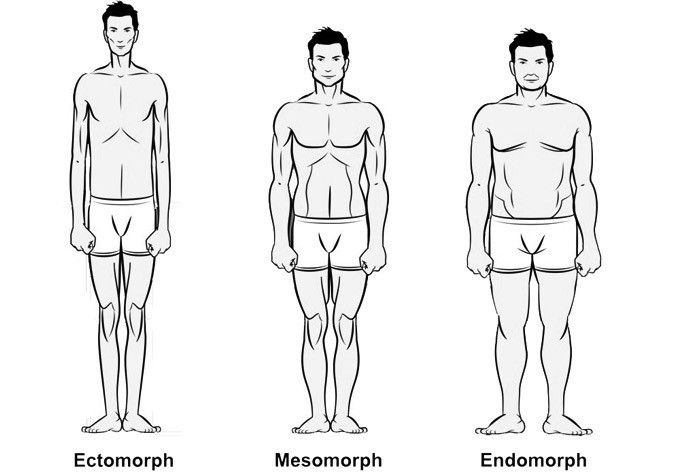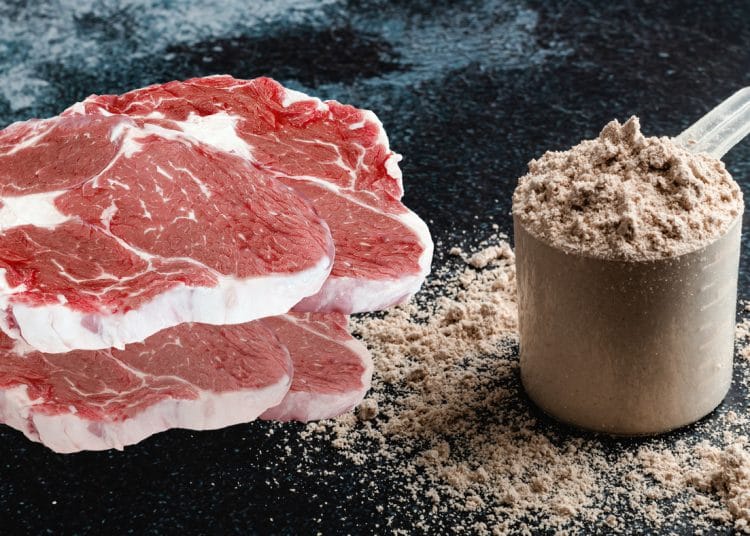According to a lot of fitness and weight loss infomercials, you can get shredded in 30-days or less while eating whatever foods you want. All you have to do is buy a few supplements and crank out some crunches.
Bad news, folks, that’s a complete and utter LIE designed to fool you into wasting your money and time.
Losing fat and getting really lean, also known as being ripped or shredded, takes time, and you can’t rush the process. Trying to lose fat too fast invariably results in muscle atrophy, severe hunger, and is usually a very unenjoyable experience.
So, forget fast fat loss fixes and prepare yourself for a sustained attack on your body fat stores.
In this article, we reveal how long it takes to lose fat and the strategies you need to use to get your body fat down enough to be shredded.
What Does Shredded Even Mean?

A lot of exercisers want to lose weight, tone up, and get lean. They want flat abdominals and a smaller waist. They may also want to trim their “bingo wings” so their arms don’t jiggle or make their thighs slimmer.
While these are all worthy goals, none of them can compare to being shredded.
Being shredded means your body fat is 10% or less for men and below 15% for women. When your body fat percentage reaches these numbers, the details of your muscles start to show through your skin, so you look like a walking anatomy chart.
Competitive bodybuilders often get their body fat much lower than this to achieve maximum definition. However, in most cases, they only maintain this very low level of body fat for a short time and bulk up (regain fat) between shows.
So, before you embark on your journey to get shredded, ask yourself if that’s REALLY what you want. Or, would you be happier and more comfortable being moderately lean, instead.
Bottom Line: Getting shredded means achieving a very low level of body fat, which may not be sustainable in the long term.
How Long Does It Take to Get Shredded?
Unfortunately, it’s impossible to tell you exactly how long it will take to get shredded. That’s because there are lots of variables that will affect your progress. We’re all individuals, and, as such, we can’t predict how quickly (or slowly) you’ll lose fat.
Some factors are modifiable, which means you can control them, such as your diet and training. However, other factors are unmodifiable and are often the result of your genetics.

The factors that will determine how long it will take to get shredded include:
Your current body fat percentage
The higher your current level of body fat is, the longer it’ll take to get it low enough to consider yourself shredded. So, for example, it’ll take longer to get to 9% bodyfat from 25% than it would from 15%. The leaner you are now, the faster you’ll get shredded.
Your motivation and dedication
Getting shredded takes effort and perseverance. You’ll need to work out hard, eat healthily, and get plenty of sleep; it’s a full-time undertaking!
If you are consistent, you should make good progress toward your goal. But, if you skip workouts and keep breaking your diet, your progress won’t be as fast. In general, the harder you work, the quicker you’ll get shredded.
Your genetics
Not everyone is destined to get shredded. Some people are just genetically programmed to maintain a higher level of body fat. That doesn’t mean you can’t lose fat and get lean. You just may be unable to get truly shredded.

Your body type will also affect how easily you can lose fat. There are three accepted body types, called somatotypes; endomorph, ectomorph, and mesomorph.
Endomorphs are genetically predisposed to gaining fat and often have a more challenging time losing it than naturally slender ectomorphs and more muscular mesomorphs.
Related: Body Type Quiz: Find Your Body Type Endomorph, Ectomorph, or Mesomorph?
How to Get Shredded
So, while we can’t tell you how long it’ll take to get shredded, we can tell you how to do it! Use these strategies to reach your body composition goals.
1. Create a calorie deficit

Body fat is stored energy, and every pound is roughly equal to 3,500 calories. So, to lose a pound of fat, you need to “burn” 3,500 more calories than you consume. This is called creating a calorie deficit or a negative energy balance.
Trying to lose fat too fast often leads to muscle loss, and that will reduce your metabolic rate and leave you looking skinny. So, it’s generally best to lose fat more slowly – say 1-2 pounds a week.
That means creating a modest calorie deficit of around 500 per day.
Such a deficit should be manageable and sustainable but will still produce reliable results. You’ll probably lose more than a pound per week because you’ll also be exercising, which also burns calories and fat. But, from a dietary perspective, you should avoid starving yourself in an attempt to lose fat faster.
Make sure you consume the right amount of calories by tracking your food intake. Make adjustments based on your progress.
Use this calorie deficit calculator to determine how much you should eat to lose fat and get shredded.
2. Pump up the protein

While consuming fewer calories is critical for losing fat and getting shredded, you should not reduce your protein intake. Instead, cut calories by eating less fat or carbs. Why? Because consuming protein is crucial for maintaining your existing muscle mass
Remember, we want to lose fat while preserving muscle. If you lose fat AND muscle, your body fat percentage may not actually change all that much, even though your scale weight decreases.
As well as preserving muscle tissue, consuming protein also revs up your metabolism for faster fat loss, and it’s also satiating or filling. Protein is your getting shredded superfood!
Most exercisers need about one gram of protein per pound of bodyweight or around two grams per kilogram.
Alternatively, you can use our protein intake calculator to determine your daily protein requirements.
3. Keep hitting the weights
While cardio can help you lose fat faster, it can also lead to muscle loss. As such, to get shredded, you MUST keep on strength training. Lifting weights will help maintain your existing muscle mass, and that will help prevent your metabolic rate from falling into decline.
Lifting weights also burns calories and increases your insulin sensitivity, both of which will contribute to fat loss and getting shredded.
You can increase the caloric cost of your strength training workouts in several ways, so you get shredded faster.
Good fat burning/muscle preserving workouts include:
4. Use (but don’t abuse) cardio

Cardio burns calories and that could speed up fat loss, so you get shredded sooner. But, doing a lot of cardio could also lead to muscle atrophy. As such, it’s best to limit cardio to just a couple of brief workouts per week, preferably using HIIT.
HIIT, short for high-intensity interval training, stimulates your fast-twitch muscle fibers leading to muscle gain or, at least, muscle preservation. In contrast, LISS or low-intensity steady-state cardio could cause atrophy and a decrease in your resting metabolic rate.
But, what about all those bodybuilders who do hours of (often fasted) cardio in the lead-up to show without losing a lot of muscle? That’s the power of anabolic steroids. Performance-enhancing drugs prevent the muscle loss that often accompanies chronic cardio in a hypocaloric state.
For natural lifters, all that cardio would probably cause significant muscle loss.
If you feel you need to do more cardio to reach your goal of getting shredded, you probably need to revisit your diet. Eating a little less is invariably more effective than doing hour after hour of muscle-catabolizing cardio.
5. Do more NEAT
No, NEAT is not a new fat-burning supplement or drug. Instead, it’s short for Non-Exercise Activity Thermogenics. In simpler terms, NEAT is physical activity that is additional to your workout.
Examples of NEAT include:
- Walking
- Cycling for transport
- Gardening
- Household chores, e.g., cleaning, taking out the trash, DIY
- Recreational sports
- Playing with your kids
Basically, anything that gets you up and moving will increase your daily caloric expenditure, leading to a larger energy deficit and faster fat loss. However, because NEAT is very low intensity, it won’t detract from your workouts or impair recovery and won’t cause muscle atrophy.
Ideally, you should try to clock up a couple of hours of NEAT a day. One easy way to do this is to accumulate 10,000 steps per day. Use a smartwatch or phone to track NEAT. Just moving more and sitting less will help you get shredded faster.
6. Get plenty of sleep

Getting less than the recommended 7-9 hours of sleep per night can cause fat gain and muscle atrophy. So, it makes sense that if you want to get shredded, you need to get at least 7-to-9 hours of sleep per night.
Failing to get enough sleep will:
- Increase hunger and carb cravings
- Make training harder and reduce workout performance
- Reduce your willpower
- Reduce motivation
- Increase fat storage
- Increase cortisol
- Decrease growth hormone and testosterone
- Interfere with recovery
- Decrease insulin sensitivity
All of which will make getting shredded even harder than it needs to be.
Read more about the importance of sleep for body recomposition here.
7. Supplement wisely
Supplements could help you get shredded faster, but you need to use the right products. For example, this is NOT the time to use a high-calorie mass gainer!

Useful supplements for shedding unwanted body fat while preserving muscle include:
Creatine
Creatine is a popular supplement. It can help build muscle and, just as importantly, prevent muscle breakdown or catabolism. As such, it could make your goal of getting shredded a little easier to achieve. Creatine is safe to use, cheap, and readily available.
Use our creatine calculator to determine how much creatine you need to use for optimal results.
Protein powder
We’ve already discussed how important protein is for fat loss and muscle preservation. However, most protein sources are also high in fat, and therefore, calories. Protein powder is almost pure protein. Using it can save you a lot of calories, making it easier to maintain your calorie deficit. Try replacing one meal a day, such as breakfast, with two scoops of your favorite protein powder mixed with water.
ZMA
This popular supplement is reported to increase anabolic hormone production and enhance sleep. These two effects mean that it could help you get shredded faster.
Thermogenic pre-workout
Thermogenic pre-workouts boost your energy so you can work out harder and longer than usual. Some also contain ingredients designed to enhance your pump. But, thermogenic pre-workouts are designed to do all these things AND improve fat burning. As such, they may be helpful in your quest to get shredded.
Fat burners
Like thermogenic pre-workouts, fat burners are formulated to enhance fat loss. Some also contain ingredients to help ward off hunger. While the effect of these supplements is relatively mild, they can still be helpful when you’re trying to get shredded.
8. Be patient!
Depending on your starting point, getting shredded could take anywhere from three to 12 months or more. Bodybuilders usually give themselves 12-16 weeks to get in shape for a show, but they’re generally already pretty lean.
So, don’t get despondent if your progress is slower than you’d like. When it comes to getting shredded, slow and steady is invariably the best way to go. Yes, you CAN lose fat faster, but then you run the risk of losing muscle mass, too. Plus, you’ll probably be hungry all the time, making it harder to stick to your diet.
Patience is a virtue, so take a breath, count to ten, and accept that it’s probably going to take a while to get truly shredded.
Wrapping Up
There is a massive difference between losing a few pounds to get lean and getting shredded. Getting shredded is an extreme undertaking, and not everyone is cut out to achieve such low levels of body fat.
That said, you won’t know until you try, and even if you can’t get genuinely shredded, everyone can lose fat and get leaner, so they look more defined. Losing fat is usually good for your health, too.
As for how long it’ll take you to get shredded, that’s a question we just can’t answer. But the sooner you start and the harder you work, the faster you’ll find out!


